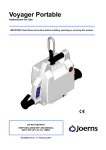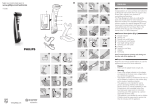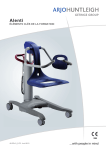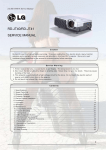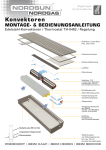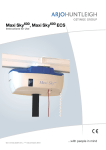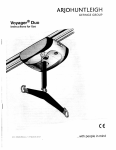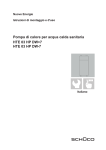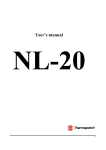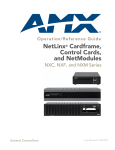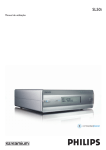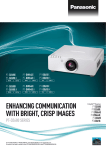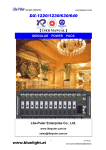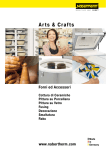Download Flowtron ACS800 Instructions for Use Manual
Transcript
FLOWTRON ACS800 +TRI PULSE INSTRUCTIONS FOR USE 0086 ...with people in mind Contents General Safety . . . . . . . . . . . . . . . . . . . . . . . . . . . . . . . . . . . . . . . . . . . . . . . . . . . . . . . iii Introduction . . . . . . . . . . . . . . . . . . . . . . . . . . . . . . . . . . . . . . . . . . . . . . . . . . . . . . . . . About this Manual . . . . . . . . . . . . . . . . . . . . . . . . . . . . . . . . . . . . . . . . . . . . . . . . . . . Intended Use . . . . . . . . . . . . . . . . . . . . . . . . . . . . . . . . . . . . . . . . . . . . . . . . . . . . . . . About Flowtron ACS800 + Tri Pulse . . . . . . . . . . . . . . . . . . . . . . . . . . . . . . . . . . . . . Pump: Front View . . . . . . . . . . . . . . . . . . . . . . . . . . . . . . . . . . . . . . . . . . . . . . . . . . . Pump: Rear View . . . . . . . . . . . . . . . . . . . . . . . . . . . . . . . . . . . . . . . . . . . . . . . . . . . 1 1 1 1 2 2 Clinical Applications . . . . . . . . . . . . . . . . . . . . . . . . . . . . . . . . . . . . . . . . . . . . . . . . . . Indications . . . . . . . . . . . . . . . . . . . . . . . . . . . . . . . . . . . . . . . . . . . . . . . . . . . . . . . . . Contraindications . . . . . . . . . . . . . . . . . . . . . . . . . . . . . . . . . . . . . . . . . . . . . . . . . . . Cautions . . . . . . . . . . . . . . . . . . . . . . . . . . . . . . . . . . . . . . . . . . . . . . . . . . . . . . . . . . Guidelines and Recommendations . . . . . . . . . . . . . . . . . . . . . . . . . . . . . . . . . . . . . . 3 3 3 4 5 Controls, Alarms and Indicators . . . . . . . . . . . . . . . . . . . . . . . . . . . . . . . . . . . . . . . . 6 Control Panel With Typical LCD Screen View in Run Mode . . . . . . . . . . . . . . . . . . . 6 LED Indicators on the Front Case . . . . . . . . . . . . . . . . . . . . . . . . . . . . . . . . . . . . . . . 9 Operation . . . . . . . . . . . . . . . . . . . . . . . . . . . . . . . . . . . . . . . . . . . . . . . . . . . . . . . . . . General . . . . . . . . . . . . . . . . . . . . . . . . . . . . . . . . . . . . . . . . . . . . . . . . . . . . . . . . . . Start Up . . . . . . . . . . . . . . . . . . . . . . . . . . . . . . . . . . . . . . . . . . . . . . . . . . . . . . . . . . Standby Screens . . . . . . . . . . . . . . . . . . . . . . . . . . . . . . . . . . . . . . . . . . . . . . . . . . . Starting Therapy . . . . . . . . . . . . . . . . . . . . . . . . . . . . . . . . . . . . . . . . . . . . . . . . . . . Stopping Therapy . . . . . . . . . . . . . . . . . . . . . . . . . . . . . . . . . . . . . . . . . . . . . . . . . . Switching Off the Pump . . . . . . . . . . . . . . . . . . . . . . . . . . . . . . . . . . . . . . . . . . . . . Alarms . . . . . . . . . . . . . . . . . . . . . . . . . . . . . . . . . . . . . . . . . . . . . . . . . . . . . . . . . . . Changing Options . . . . . . . . . . . . . . . . . . . . . . . . . . . . . . . . . . . . . . . . . . . . . . . . . . Settings Adjustment . . . . . . . . . . . . . . . . . . . . . . . . . . . . . . . . . . . . . . . . . . . . . . . . 10 10 10 11 13 15 16 16 16 20 Decontamination . . . . . . . . . . . . . . . . . . . . . . . . . . . . . . . . . . . . . . . . . . . . . . . . . . . . 21 Routine Maintenance . . . . . . . . . . . . . . . . . . . . . . . . . . . . . . . . . . . . . . . . . . . . . . . . Flowtron ACS800 + Tri Pulse System . . . . . . . . . . . . . . . . . . . . . . . . . . . . . . . . . . . Pump . . . . . . . . . . . . . . . . . . . . . . . . . . . . . . . . . . . . . . . . . . . . . . . . . . . . . . . . . . . . Serial Labels . . . . . . . . . . . . . . . . . . . . . . . . . . . . . . . . . . . . . . . . . . . . . . . . . . . . . . 22 22 22 22 Troubleshooting . . . . . . . . . . . . . . . . . . . . . . . . . . . . . . . . . . . . . . . . . . . . . . . . . . . . 23 Accessories . . . . . . . . . . . . . . . . . . . . . . . . . . . . . . . . . . . . . . . . . . . . . . . . . . . . . . . . 29 Technical Specification . . . . . . . . . . . . . . . . . . . . . . . . . . . . . . . . . . . . . . . . . . . . . . 30 (i) (ii) GENERAL SAFETY Before you connect the system pump to a mains socket, read carefully all the installation instructions contained within this manual. The system has been designed to comply with regulatory safety standards including: • EN60601-1:1990/A13:1996 and IEC 60601-1:1988/A2:1995. • UL60601-1 and CAN/CSA C22.2 No. 601.1-M90. • EN60601-1:2006 and IEC 60601-1:2005 • AAMI/ANSI ES60601-1:2006 and CAN/CSA C22.2 No.60601.1(2008) Safety Warnings • It is the responsibility of the care giver to ensure that the user can use this product safely. • Make sure that the mains power cable and tubeset or air hoses are positioned to avoid causing a trip or other hazard, and are clear of moving bed mechanisms or other possible entrapment areas. • Electrical equipment may be hazardous if misused. There are no user-serviceable parts inside the pump. The pump's case must only be removed by authorised technical personnel. No modification of this equipment is allowed. • The mains power socket/plug must be accessible at all times. To disconnect the pump completely from the electricity supply, remove the plug from the mains power socket. • Disconnect the pump from the mains power socket before cleaning and inspecting. • Keep the pump away from sources of liquids and do not immerse in water. • Do not use the pump in the presence of uncontained flammable liquids or gasses. • Only the pump and garment/insert combination as indicated by ArjoHuntleigh should be used. The correct function of the product cannot be guaranteed if incorrect pump and garment combinations are used. • The Flowtron® ACS800 + Tri Pulse system is NOT intended for use in the Home Healthcare Environment (e.g. private dwellings or nursing homes). Caution (applicable to the USA market only) • US Federal law restricts this device to sale by or on the order of a physician. Precautions For your own safety and the safety of the equipment, always take the following precautions: • Do not expose the system to open flames, such as cigarettes, etc. • Do not store the system in direct sunlight. • Do not use phenol-based solutions to clean the system. • Make sure the system is clean and dry prior to use or storage. Electromagnetic Compatibility (EMC) This product complies with the requirements of applicable EMC Standards. Medical electrical equipment needs special precautions regarding EMC and needs to be installed in accordance with the following instructions: • The use of accessories not specified by the manufacturer may result in increased emissions by, or decreased immunity of, the equipment, affecting its performance. • Portable and mobile radio frequency (RF) communications equipment (e.g. mobile/cell phones) can affect medical electrical equipment. (iii) • If this equipment needs to be used adjacent to other electrical equipment, normal operation must be checked before use. • For detailed EMC information contact ArjoHuntleigh service personnel. Expected Service Life The pump has an expected service life of seven years. To maintain the condition of the pump have the pump serviced regularly according to the schedule recommended by your ArjoHuntleigh distributor. Do NOT use unapproved accessories or attempt to modify, disassemble or otherwise misuse the system. Failure to observe this caution could result in injury, or in extreme cases, death. Environmental Protection Incorrect disposal of this equipment and its component parts, particularly batteries or other electrical components, may produce substances that are hazardous to the environment. To minimise these hazards, contact ArjoHuntleigh for information on correct disposal. Design Policy and Copyright ® and ™ are trademarks belonging to the ArjoHuntleigh group of companies. As our policy is one of continuous improvement, we reserve the right to modify designs without prior notice. The content of this publication may not be copied either whole or in part without the consent of ArjoHuntleigh. © ArjoHuntleigh 2014 (iv) 1. Introduction About this Manual This manual is your introduction to the Flowtron® ACS800 + Tri Pulse system, which is a Flowtron ACS800 pump enabled for use with both Tri Pulse and uniform DVT garments. Refer to “Accessories” on page 29 for a list of the garments which can be used. You must read and fully understand this manual before using the system. Use this manual to initially set up the system, and keep it as a reference for day-to-day routines and as a guide to maintenance. If you have any difficulties in setting-up or using the system, contact your local ArjoHuntleigh sales office, listed at the end of this manual. Intended Use The intended use of this product is to prevent Deep Vein Thrombosis (DVT). The garments are single patient use only. It is not for use in the home healthcare environment. The Flowtron ACS800 + Tri Pulse system should be used as part of a prescribed plan of care (refer to “Indications” on page 3). About Flowtron ACS800 + Tri Pulse The application of external pneumatic compression has two effects: • Augments venous blood flow velocity, thereby reducing stasis. • Enhances fibrinolytic activity to reduce the risk of early clot formation. The system comprises a pump that can be used in conjunction with an extensive range of ArjoHuntleigh inflatable garments, including foot, calf and calf & thigh versions. The pump automatically adjusts to the correct therapy profile depending upon which garment type (foot, uniform DVT calf or calf & thigh, or Tri Pulse calf or calf & thigh) is connected. The tubeset is integral to the system and cannot be disconnected from the pump. The mains power supply is the primary power source for the pump. The pump incorporates an internal battery pack, which is a secondary power source to back up the pump in the event of failure or disconnection (accidentally or deliberately) from the mains power supply. 1 The system is intended for use ONLY in Professional Healthcare Facilities (e.g. hospitals or physicians’ offices). A full technical description of the Flowtron ACS800 + Tri Pulse system can be found in the Service Manual, part number SER0020, available from your local ArjoHuntleigh sales office. Pump: Front View LCD Screen and Controls Integral Carry Handle Integral Tubesets LED Indicator Tubeset 1 (Blue Button) Garment Connectors Tubeset 2 (Orange Button) Pump: Rear View Swing-out Bed-Hooks Tubeset 1 Integral Tubesets Mains Power Cord Tubeset 2 2 2. Clinical Applications Indications The intended use of the Flowtron ACS800 + Tri Pulse system is to help prevent Deep Vein Thrombosis (DVT). The system should be combined with an individualised monitoring programme. These systems represent one aspect of a DVT strategy; if the patient's condition changes the overall therapy regimen should be reviewed by the prescribing clinician. The above are guidelines only and should not replace clinical judgement. Depending on the garment type used, other clinical applications are also appropriate. The FG foot garment, in particular, has a wide range of clinical applications. Full details for clinical applications are included in the packaging of every garment. The type of garment used on an individual patient must be specified by a physician. Contraindications Uniform DVT Calf/Calf & Thigh and Tri Pulse Calf/Calf & Thigh Garments Foot Garments The system, when used with the uniform DVT calf/calf & thigh and Tri Pulse calf/calf & thigh garments, should not be used in the following conditions: 1. Severe arteriosclerosis or other ischemic vascular diseases. 2. Severe congestive cardiac failure or any condition where an increase of fluid to the heart may be detrimental. 3. Known or suspected acute deep vein thrombosis, thrombophlebitis or pulmonary embolism. 4. Any local condition in which the garments would interfere, including: • Gangrene • Recent skin graft • Dermatitis • On untreated, infected leg wounds. The system, when used with the foot garments, should not be used in the following conditions: 1. Severe congestive cardiac failure or any condition where an increase of fluid to the heart may be detrimental. 2. Known or suspected acute deep vein thrombosis, thrombophlebitis or pulmonary embolism. 3 3. Any local condition in which the garments would interfere, including: • Gangrene • Recent skin graft • Dermatitis • On untreated, infected leg wounds If you are unsure of any contraindications refer to the patient’s physician before using the device. Cautions 1. Proper garment application and connection to the pump is essential. 2. Garments should be positioned in such a way that there is no potential for sustained pressure points on the skin and underlying tissues. Lower limb positioning in relation to the garment and tubing should also be considered particularly in a patient that is unconscious, cannot feel or has reduced sensation and/or ability to move their leg(s). 3. While using the system, the patient's skin should be inspected frequently and regularly, paying particular attention to bony prominences such as the malleolus and heel. It is recommended that these checks should be performed not less than every hour if the patient cannot feel or has reduced sensation and/or ability to move their leg(s); in all other patients, perform these checks not less than every 6 hours. 4. Clinical judgement is required to determine if the patient's skin condition requires additional protective measures, or if the therapy should be discontinued and an alternative modality used. 5. Garments should be removed immediately if the patient experiences tingling, numbness, or pain, and the physician notified. 6. When used for DVT prevention, continuous external pneumatic compression is recommended until the patient is fully ambulatory. Uninterrupted use of the system is encouraged. 7. The system should be USED WITH CAUTION on patients with: • Insensitive extremities. • Diabetes. • Impaired circulation. • Fragile or impaired skin. 4 These are guidelines only and should not replace clinical judgement and experience. Guidelines and Recommendations General • While using the system, the patient’s limbs should be checked not less than every six hours, and more often Recommendations if the patient has known circulatory or skin problems, or is diabetic. • Note: Many patients are at risk for pressure ulcers on the heel. Use of the foot garments does not negate the necessity for heel protection and proper skin care. • Clinical judgment should be used to determine if the patient’s skin condition requires additional measures, or if the treatment should be discontinued and alternative modalities used. • ArjoHuntleigh does not recommend the use of compression stockings with its system. If these are ordered by the physician, the clinician should ensure that the compression stockings are properly measured, applied and worn by the patient. Any compression stocking used should be routinely checked to ensure continued proper fit and application, in addition to assessing the condition of the skin. • Where appropriate, patients should be instructed in the proper use of the system, the purpose of therapy and that any problems should be reported to the nursing staff. DVT Prophylaxis • The system should be applied to the patient preoperatively, prior to the induction of anaesthesia. • The system should be used continuously for no less than 72 hours post-operatively or until the patient becomes fully ambulatory. • If the garment cannot be applied to the operative limb during surgery, it may be applied to the limb once the patient reaches the recovery unit. • In the non-surgical patient, the system should be initiated immediately the risk of DVT formation is identified. 5 3. Controls, Alarms and Indicators Control Panel With Typical LCD Screen View in Run Mode Garment Type and Therapy Indicator (the possible garment types are detailed in “LCD Screen” section below) Mains/Power Indicator Battery Indicator LED Indicator Pressure Indicator On/Off Button Stop 2h LCD Screen Patient Hours Meter Start/Stop Therapy “Down” Select Button On/Off Button and LED Indicator Start/Stop Button “Up” Select Button Press the On/Off button to power up the pump from its unpowered state and put it into Standby (refer to “Standby Screens” on page 11). Connecting the pump to the mains power supply will automatically power up the pump from its unpowered state and put it into Standby, without having to press the On/Off button. Make sure the system has been arranged so that the power cable and garment hoses do not pose a trip or strangulation hazard. The adjacent LED indicator shows the pump status: LED Colour Mains Power Pump Status Extinguished Disconnected Off Amber Connected Off Amber Connected or disconnected Standby Green Connected or disconnected Run To switch off the pump, press and hold the On/Off button for approximately 2 seconds until the LCD screen goes blank, and then release. If you switch off the pump and then press the On/Off button to power it back up: 6 Start/Stop Button “Up” and “Down” Select Buttons LCD Screen • If the mains power is disconnected, the pump runs the diagnostic tests and then goes into Standby. • If the mains power remains connected, the pump goes into Standby and does not run diagnostic tests. This has the following functions depending on the text or icon displayed above the button: • To start or stop therapy. • To confirm the option selected in the Options menu. When the pump is in Standby, press the Start/Stop button to put the pump into the Run mode and start therapy; the LED indicator adjacent to the On/Off button will change to green and the LEDs on the front case will be illuminated green. To stop the therapy and put the pump into Standby, press and hold the Start/Stop button for approximately 2 seconds until the Standby screen is displayed and then release the button. The LED indicator adjacent to the On/Off button changes to amber and the LEDs on the front case are extinguished. These have the following functions depending on the text or icon displayed above the buttons: • To select the Options menu. • To move up and down the Options menu. • To mute certain audible alarm conditions. This displays the pump operating mode and status: 1. Foot, uniform DVT calf (or calf & thigh) or Tri Pulse calf (or calf & thigh) therapy indications. These show what garment type is connected to each tubeset and when each garment is being inflated: Uniform DVT Calf or Calf & Thigh Garment Foot Garment Tri Pulse Calf or Calf & Thigh Garment • All therapy indications are initially shown as grey to indicate they are deflated. • A therapy indication changes to black to show it is inflating. • The therapy indication reverts to grey when it starts to deflate. • The garment connector on the end of each tubeset has a push button which is colour-coded 7 and has a number marked on it: blue “1” or orange “2”. The numbers corresponds with the “1” and “2” on the right side of the LCD screen. Where the tubesets enter the side of the pump, the top tubeset is marked “1”. 2. Pressure indication: this is the inflation pressure applied to the garment, as follows: • Foot garment: 130 mmHg. • Uniform DVT calf and calf & thigh. The pressure is adjustable between 35 - 65 mmHg. To be adjusted only by authorised personnel. The pump will default to the last pressure set. • Tri Pulse calf and calf & thigh garments: 45 mmHg. 3. Mains power indications: The pump is connected to the mains power supply. The pump is not connected to the mains power supply, but is powered by the internal battery only. 4. Battery indication: • When the pump is connected to the mains power supply, then: •• If the battery is fully charged, the indicator will be static and show “full”. •• If the battery is not fully charged, the indicator will “scroll” from “empty” to “full” to indicate that the pump is being charged. • When the pump is NOT connected to the mains power supply, then the indicator is static and shows the charge remaining in the battery: Battery Empty Battery 1/3 Full Battery 2/3 Full Battery Full The battery has a service life of 5 years (600 charge cycles). It is not user replaceable and must be replaced as part of the service procedure. 5. Patient Hours Meter: if this is selected, the total therapy time is shown (in hours). Refer to “Changing Options” on page 16 to select and/or clear the Patient Hours Meter. 8 • This is the pump run time since the Patient Hours Meter was last cleared. • The factory default is to NOT show the Patient Hours Meter on the LCD screen. 6. Warning and alarm indications (refer to “Troubleshooting” on page 23). LED Indicators on the Front Case There are two sets of LED indicators on the front case of the pump. Their status is as follows: LED Colours Pump Status Warnings/Alarms Extinguished Off or Standby -- Green (Static) Run Red (Flashing) Run • No fault detected. • Warning only detected. Fault detected with full audible and visual alarm 9 4. Operation These instructions cover the day-to-day operation of the system. Other operations, such as maintenance and repair, should only be carried out by suitably qualified personnel. Refer to “Controls, Alarms and Indicators” on page 6 for a description of the controls, indicators and LCD screen. If the operation or performance of the pump changes during use, refer to “Troubleshooting” on page 23 of this IFU before calling a service engineer or contacting your local ArjoHuntleigh sales office. Start Up To switch on the pump, do one of the following: • Connect the pump to the mains power supply using the power cable provided. The pump will power up automatically and start running a diagnostic test, and display the following screen: General Progress Bar • If operating from just the battery (disconnected from the mains power supply), press the On/Off button. The pump will power up and start running the diagnostic test, and display the following screen. Note the “Checking Battery” text and the “Mains power not connected” icon at the top of the screen: Checking Battery “Mains power not connected” icon 10 After a few seconds, the following screen is displayed, showing “Battery OK”: Battery OK If the text at the top of the screen says “Low Battery” then you must connect mains power before you can start therapy. • At the end of the diagnostic test, the following screen is displayed, showing the “Hours Run” at the top, the software version of the pump at the bottom and “ACS800 Tri Pulse” below “Flowtron”: Hours Run: 145 ACS800 Tri Pulse XX.XXXX-XXX Standby Screens “Mains power connected” icon The “Hours Run” value displayed on this screen is for service use only, and is different to the “Patient Hours Meter” displayed during therapy. Refer to “Controls, Alarms and Indicators” on page 6 for the “Patient Hours Meter”. The “No Garments” Standby screen is then displayed: Attach garments Battery Indication Options There are two “leg” icons with no garments attached and the text “Attach garments” at the top of the screen; this indicates that no garments are currently connected to either tubeset. There is no text above the Start/Stop button until at least one garment is connected to a tubeset. Apply the prescribed ArjoHuntleigh garment(s) to the patient by following the instructions included in the garment packaging. 11 Garments are for single patient use only. Do not use the garments on a different patient after treatment. Connect the garment(s) to the pump by pushing the garment connector firmly into the pump tubeset connector until it “clicks”. The pump LCD screen will show which garments are connected to each tubeset connector: the garment connector with the blue push button is “1” and the one with the orange push button is “2”. If any pump options (Audio Alarm Volume, Patient Hours Meter or Language) need to be changed, they must be changed before the patient therapy is started. Refer to “Changing Options” on page 16. The following six screens show typical Standby screens with different garment configurations: Start Start Options Foot Garment Connected to Tubeset 1 Start Uniform DVT Calf (or Calf & Thigh) Garment Connected to Tubeset 1 Options Start Two Uniform DVT Calf (or Calf & Thigh) Garments Connected Start Options Options Foot and Uniform DVT Calf (or Calf & Thigh) Garments Connected Start Options Options Foot and Tri Pulse Calf (or Calf & Thigh) Garments Connected Tri Pulse Calf (or Calf & Thigh) Garment Connected to Tubeset 1 12 Starting Therapy Make sure the garment(s) are fitted correctly to the patient and the pump. Make sure any pump options have been changed if necessary. If the pump is to be positioned under a bed, make sure it is placed horizontally (with the bed-hooks underneath) to prevent damage to the pump. While the pump is in Standby, the LEDs on the front case remain extinguished. Press the button below “Start” to start the therapy. The LEDs on the front case change to static green. It is recommended that the following checks are carried out at the start of, and throughout, the therapy: • Check the LCD screen icons to confirm that the correct type of garment(s) have been connected. • During garment inflation, check the LCD screen to confirm that there are no fault messages displayed and that the correct pressure is being supplied. The supplied inflation pressures for the different garments are: • Foot garment: 130 mmHg. • Uniform DVT calf and calf & thigh garments: 40 mmHg. • Tri Pulse calf and calf & thigh garments: 45 mmHg. Initial inflation cycles (up to 10) may not show the correct inflation pressure. This is to be expected. • Check that there are no kinks in the pump tubesets. • Check that the pump tubesets and connectors do not cause the patient any discomfort. • Regularly check that the garments remain correctly fitted to the patient. The pump will inflate and deflate each garment in turn, as follows, starting with garment 1: The following example shows two foot garments fitted to the pump. 1. Both garments are initially deflated. The garment pressure is displayed on the left side of the screen. If the Patient Hours Meter is selected in the “Options” menu (refer to “Changing Options” on 13 page 16), the total elapsed time (in hours) is shown in the bottom right of the screen: Stop 2h Patient Hours Meter 2. Foot garment 1 is inflated to 130 mmHg, with a ramp up and hold time of 3 seconds. The foot garment indicator is black while it is inflated: Stop 2h 3. The foot garment is deflated to zero. Both garment indicators are grey: Stop 2h 4. Foot garment 2 is then inflated to 130 mmHg, with a ramp up and hold time of 3 seconds. The foot garment indicator is black while it is inflated: Stop 14 2h 5. The foot garment is deflated to zero. Both garment indicators are grey: Stop 2h 6. This cycle of alternate garment inflations repeats from step 2 (above) until the therapy is stopped. If calf (or calf & thigh) garments are attached to the pump, then each of these garments is inflated to 40 mmHg (uniform DVT) or 45 mmHg (Tri Pulse), with a ramp up and hold time of 12 seconds. If a foot garment, uniform DVT calf (or calf & thigh) or Tri Pulse calf (or calf & thigh) garment are attached to the pump, then since the inflate and hold times for a foot garment are shorter than for a calf (or calf & thigh) garment, there is a modified inflation sequence: the foot garment is always inflated twice in succession and then the uniform DVT calf (or calf & thigh) or Tri Pulse calf (or calf & thigh) garment is inflated, as follows. The first garment to be inflated is always garment 1. 1. Inflate the foot garment to 130 mmHg. 2. Deflate the foot garment. 3. Repeat the inflation of the foot garment to 130 mmHg. 4. Deflate the foot garment. 5. Inflate the uniform DVT calf (or calf & thigh) garment to 40 mmHg or the Tri Pulse calf (or calf & thigh) garment to 45 mmHg. 6. Deflate the uniform DVT calf (or calf & thigh) garment or Tri Pulse calf (or calf & thigh) garment. 7. This cycle of garment inflations repeats from step 1 (above) until the therapy is stopped. Stopping Therapy To stop the therapy and put the pump into Standby, press and hold the Start/Stop button for approximately 2 seconds until the Standby screen is displayed (refer to “Standby Screens” on page 11) and then release it. The LED indicator by the On/Off button changes to amber and the LEDs on the front case are extinguished. 15 If the pump stays in Standby, then: 1. After 5 minutes the LCD display backlight is dimmed. 2. After a further 15 minutes (20 minutes total) the pump automatically switches off. The LED indicator will remain amber if the pump is connected to the mains power and extinguished if the mains power is disconnected. Switching Off the Pump 1. Make sure the therapy is stopped and the pump is in Standby (refer to “Stopping Therapy” on page 15). 2. Press and hold the On/Off button for approximately 2 seconds until the LCD screen goes blank and then release it. The LED indicator will remain amber if the pump is connected to the mains power and extinguished if the mains power is disconnected. Alarms On detection of a fault condition, the pump provides a visual-only warning followed by an audible and visual alarm if the fault is not cleared. 1. The visual-only warning is a fault message on the LCD screen. The LED indications remain unchanged and there is no audible alarm. 2. If the fault is not cleared then the warning is replaced by an audible and visual alarm, which consists of: • A fault message on the LCD screen. • The LED indicators on the front of the pump change to red and start flashing. • An audible alarm will sound which increases in pitch and intensity if the alarm is ignored. The warning and alarm can be cleared by either: • Checking and rectifying the fault on the system, or • Pressing the button below “Stop” to put the pump into Standby. Refer to Section 7, Page 23 “Troubleshooting” for the alarms, their possible causes and their remedies. Changing Options To change the pump operating options, the pump must be in Standby. If the pump is in Run mode, press and hold the button below “Stop” for 2 seconds to put the pump into Standby. 16 On the Standby screen, press the button below “Options” and the “Options” menu is displayed: • The “border” around an item indicates the currently selected item. • To select a new menu item, press the buttons below the “up” and “down” arrows. • To confirm the new menu item, press the button below the “tick”. • To exit and return to the Standby screen, select and confirm “Exit” on the menu. 1. To change the Audio Alarm Volume setting: • On the “Options” menu, select and confirm “Audio Alarm Volume” and the “Audio Alarm Volume” screen is displayed: Set Volume High Set Volume Low Back Exit • The “tick” on the left side of the screen shows that the alarm is currently set to High Volume. • Use the “up” and “down” buttons to select the new volume setting. Press the “tick” button to confirm the new volume. The “tick” now shows the new setting. • To exit and return to the Standby screen, select and confirm “Exit”. • To change another option, select and confirm “Back” and the “Options” menu is displayed. 2. The Patient Hours Meter settings. When selected, the Patient Hours Meter shows the total therapy time at the bottom right of the LCD screen during therapy. This is the elapsed time since the Patient Hours Meter was last cleared using these commands. 17 To change the settings: • On the “Options” menu, select and confirm “Patient Hours Meter” and the “Patient Hours Meter” screen is displayed: Show Patient Hours Clear Patient Hours Back Exit Hours Run 00001 • A “tick” to the left of “Show Patient Hours” indicates that the total therapy time is shown in the bottom right of the LCD screen during therapy. • To change this setting, use the “up” and “down” buttons to make sure the “Show Patient Hours” option is selected, and then press the “tick” button to toggle the option on or off. • The text “Hours Run 00001” indicates the current value of the Patient Hours Meter. • To clear the elapsed time showing in the Patient Hours Meter (for example, when therapy is started on a new patient), use the “up” and “down” buttons to select the “Clear Patient Hours” option. • Press the “tick” button TWICE to clear the “Hours Run” to “00000”. The Patient Hours Meter on the LCD screen will show “0h” during therapy, if selected. You must press the “tick” button twice. • To exit and return to the Standby screen, select and confirm “Exit”. • To change another option, select and confirm “Back” and the “Options” menu is displayed. 18 3. To select a new Language: • On the “Options” menu, select and confirm “Language” and the “Language” screen is displayed: EN - English ES - Espanõl FR - Français DE - Deutsch IT - Italiano • The “tick” on the left side of the screen shows that the language is currently set to “English”. • Use the “up” and “down” buttons to select the new language, e.g. “FR - Français”: The list of languages depends on the territory, but is typically: EN - English ES - Español FR - Français DE - Deutch IT - Italiano NL - Nederlands PT - Português SV - Svenska NO - Norsk DA - Dansk EN - English ES - Espanõl FR - Français DE - Deutsch IT - Italiano • Press the “tick” button to confirm that “French” has been selected. • A second confirmation screen is displayed with just the new language (French) displayed: FR - Français Back Exit 19 • Press the “tick” button to confirm the change of language to French. • The screen now displays the “Options” menu in the new language (French): Volume alarme audio Compteur patient Langue Sortie To exit and return to the Standby screen, select and confirm “Sortie”. Settings Adjustment The pump is configured to give the recommended therapy for each garment type and does not require any direct setting by the clinician or nurse. If the physician requires different therapy settings for uniform DVT calf and calf & thigh garments, then limited changes can be made to the pump pressure by accessing a Service screen on the pump. Contact your local ArjoHuntleigh sales office for details. The pump pressures for Foot garments and Tri Pulse calf and calf & thigh garments are fixed and cannot be changed. The pressure range and factory default pressure for the uniform DVT calf and calf & thigh garments are detailed in the “Technical Specification” on page 30. 20 5. Decontamination The following processes are recommended, but should be adapted to comply with the local or national guidelines (Decontamination of Medical Devices) which may apply within the Healthcare Facility or the country of use. If you are uncertain, you should seek advice from your local Infection Control Specialist. The system should be routinely decontaminated between patients and at regular intervals while in use; as is good practice for all reusable medical devices. WARNING Remove the electrical supply to the pump by disconnecting the mains power cable from the mains power supply before cleaning. Protective clothing should always be worn when carrying out decontamination procedures. Caution Do not use Phenol-based solutions or abrasive compounds or pads during the decontamination process as these will damage the surface coating. Avoid immersing electrical parts in water during the cleaning process. Do not spray cleaning solutions directly onto the pump. Do not immerse the tubeset in water. To clean Clean all exposed surfaces and remove any organic debris by wiping with a cloth moistened with a simple (neutral) detergent and water. Do not allow water or cleaning solutions to collect on the surface of the pump. Chemical Disinfection We recommend a chlorine-releasing agent, such as sodium hypochlorite, at a strength of 1,000ppm available chlorine (this may vary from 250ppm to 10,000ppm depending on local policy and contamination status). Wipe all cleaned surfaces with the solution, then wipe using a cloth moistened with water and dry thoroughly. Alcohol based disinfectants (strength 70%) may be used as an alternative. Ensure the product is dry before storage. If an alternative disinfectant is selected from the wide variety available, we recommend that suitability for use is confirmed with the chemical supplier prior to use. Caution Garments are single patient use and hence cannot be cleaned or reused. 21 6. Routine Maintenance Flowtron ACS800 + Tri Pulse System Maintenance The equipment has been designed to be maintenancefree between service periods. Servicing ArjoHuntleigh will make available on request service manuals, component parts lists and other information necessary for ArjoHuntleigh trained personnel to repair the system. Service Period ArjoHuntleigh recommend that the pump is serviced every 12 months by an ArjoHuntleigh authorised service agent. Pump General Care, Maintenance and Inspection Serial Labels Check all electrical connections and power cable for signs of excessive wear. Check the tubeset and connectors for any damage. In the event of the pump being subjected to abnormal treatment, e.g. immersed in water or dropped, the unit must be returned to an authorised service centre. The serial number for the pump is on the label on the back of the pump case. Quote this serial number when requesting service. 22 7. Troubleshooting On detection of a fault condition, the pump provides a visual-only warning followed by an audible and visual alarm if the fault is not cleared. Warning Conditions The visual-only warning is a fault message on the LCD screen. The LED indications remain unchanged and there is no audible alarm (except Battery Low warning). The warning can be cleared by either: • Checking and rectifying the fault on the system, or • Pressing the button below “Stop” to put the pump into Standby. Alarm Conditions If the fault is not cleared then the warning is replaced by an audible and visual alarm, which consists of: • A fault message on the LCD screen. • The LED indicators on the front of the pump change to red and start flashing. • An audible alarm will sound which increases in pitch if the alarm is ignored. The alarm can be cleared by either: • Checking and rectifying the fault on the system, or • Pressing the button below “Stop” to put the pump into Standby. For simplicity, the following screens (except Battery Low, Hardware Fail and Pump Too Hot) show a fault detected on garment 1; similar fault messages are displayed if the fault is detected on garment 2 (or both garments). If the trouble shooting procedures do not return the system to normal performance, stop using the system immediately and call the service engineer. Condition Description and Corrective Action Low Pressure A The warning is activated after 4 inflation cycles and shows a leak in garment 1 or its tube. Screen A alternates with the “standard” Run screen. The warning changes to an alarm after 10 inflation cycles and shows a leak in garment 1 or its tube. Screen A alternates with screen B. Stop B Examine the garment and tubeset for leaks. The warning or alarm will be cleared if the leak is repaired. Stop 23 Condition Description and Corrective Action Blocked Garment/Kinked Tube A The warning is activated after 3 inflation cycles and shows a blocked garment 1 or kinked tube. Screens A and B alternate with the “standard” Run screen. Stop B Stop The warning changes to an alarm after 10 inflation cycles and shows a blocked garment 1 or kinked tube. Screen C alternates with screens A and B. Examine the garment and tubeset for kinks or blockages. The warning or alarm will be cleared if the kink or blockage is repaired. C Stop Garment Removed A Garment unplugged Connect garment B Stop This warning is activated after 1 inflation cycle if the pump detects that a garment has been removed while the pump is in the Run state; it shows that garment 1 has been removed. Screen A alternates with screen B. The warning changes to an alarm after 10 inflation cycles if the pump continues to detect that a garment has been removed while the pump is in the Run state; it shows that garment 1 has been removed. Screen B now alternates with screen C. Reconnect or replace the garment. The warning or alarm will be cleared if the garment is reconnected or replaced. C Stop 24 Condition Description and Corrective Action Battery Low These Battery Low warning and alarm will only be activated when the pump is operating from just the battery (the mains power is disconnected). Connect power A Mute Start Options B Mute Start Options Connect power C Mute If the pump is in Standby: • The warning will be activated when the remaining charge in the battery is less than 15%. Screen A alternates with screen B. Therapy can not be started. There is an audible tone when the Start button is pressed. Pressing Mute will silence the audible tone. Connect the mains power supply to the pump to clear the warning and start therapy. Stop D mute When any of these Battery Low warning or alarm screens are activated, connect the pump to the mains power supply to recharge the battery and continue therapy. Stop Connect power E If the pump is in the Run state: • The warning will be activated when the remaining charge in the battery is less than 15%. There is an audible tone and screen C alternates with screen D. Therapy can continue. Pressing Mute will silence the audible tone. Connect the mains power supply to the pump to clear the warning and continue therapy. • When the remaining charge is less than 10%, the full alarm is activated. Screen E alternates with screen F. Therapy is suspended and the alarm tone can not be muted. Connect the mains power supply to the pump to clear the alarm and restart therapy. F 25 Condition Description and Corrective Action Hardware Fail This alarm is activated if the pump detects an internal fault. The “spanner” symbol is permanently displayed. Therapy is suspended. Switch off the pump. Call the service engineer. Faulty Tubeset Faulty Tubeset The Faulty Tubeset warning and alarm are activated if the pump detects a fault in the tubeset. ! A B C Stop Faulty Tubeset ! For both conditions: • Switch off the pump. • Call the service engineer. If the pump is in Standby when the faulty tubeset is detected: • A warning is activated. Screen A alternates with screen B, and shows a faulty tubeset 1. Therapy can not be started. If the pump is in the Run state when the faulty tubeset is detected: • An alarm is activated. Screen C alternates with screen D, and shows a faulty tubeset 1. Therapy can continue. • When the operator next stops the pump and puts it into Standby, the alarm reverts back to the warning in which screen A alternates with screen B, and shows a faulty tubeset 1. Therapy can not be restarted. D Stop 26 Condition Description and Corrective Action Setup Required The Setup Required warning and alarm are activated if the pump detects a fault in the tubeset. Setup required ! A Setup required B Setup required C Setup required Faulty Tubeset ! D Service Required 130 Stop For both conditions: • Switch off the pump. • Call the service engineer. If the pump is in Standby when the faulty tubeset is detected: • A warning is activated. Screen A alternates with screen B, and shows a faulty tubeset 1. Therapy can not be started. If the pump is in the Run state when the faulty tubeset is detected: • An alarm is activated. Screen C alternates with screen D, and shows a faulty tubeset 1. Therapy can continue. • When the operator next stops the pump and puts it into Standby, the alarm reverts back to the warning in which screen A alternates with screen B, and shows a faulty tubeset 1. Therapy can not be restarted. The “spanner” icon appears at the lower left side of the screen to indicate that the pump requires service attention. This will normally occur after the preset service interval has expired. Therapy can continue until service is available. Call the service engineer. Service “Spanner” icon 27 Condition Description and Corrective Action Pump Too Hot This alarm is activated when the temperature inside the pump exceeds 55°C. “Pump too hot!” is displayed at the top of the “standard” Run screen (screen A) and an audible alarm sounds. Therapy can continue. Make sure the pump is connected to mains power if this alarm is activated, and check that the ventilation holes on the pump rear case are not covered or blocked. Pump too hot! A Stop B When the temperature inside the pump exceeds 60°C, the full alarm is activated. Screen B is permanently displayed and an audible alarm sounds. Therapy is suspended. Switch off the pump and allow pump to cool. Then switch back on and continue therapy. If either alarm continues, switch off the pump and call the service engineer. 28 8. Accessories The Flowtron ACS800 + Tri Pulse pump should only be used with the following garments: CALF GARMENTS Order Code Type Calf Circumference Therapy DVT10 DVT10 Standard Calf Garment Up to 43 cm (17”) Uniform DVT10S DVT10S Standard Calf Garment (Sterile) Up to 43 cm (17") Uniform L501-M L501-M Standard Calf Garment Up to 43 cm (17") Uniform DVT20 DVT20 Large Calf Garment Up to 58 cm (23") Uniform DVT60 DVT60 Extra Large Calf Garment Up to 71 cm (28") Uniform DVT60L DVT60L Bariatric Calf Garment Up to 81 cm (32") Uniform TRP10 TRP10 Regular Calf Garment Up to 43 cm (17") Sequential TRP20 TRP20 Large Calf Garment Up to 58 cm (23") Sequential TRP60L TRP60L Bariatric Calf Garment Up to 81cm (32") Sequential CALF & THIGH GARMENTS Order Code Type Thigh Circumference Therapy DVT30 DVT30 Standard Thigh Garment Up to 71cm (28") Uniform DVT30S DVT30S Standard Thigh Garment (Sterile) Up to 71cm (28") Uniform L503-M L503-M Standard Thigh Garment Up to 71cm (28") Uniform DVT40 DVT40 Large Thigh Garment Up to 89cm (35") Uniform TRP30 TRP30 Regular Thigh Garment Up to 71cm (28") Sequential TRP40 TRP40 Large Thigh Garment Up to 89cm (35") Sequential FOOT GARMENTS Order Code Type Shoe Size Therapy FG100 Foot Garment - Regular UK Men/Women up to size 7 US Women up to size 9 US Men up to size 7 EURO up to size 40 Uniform FG100S Foot Garment - Regular (Sterile) UK Men/Women up to size 7 US Women up to size 9 US Men up to size 7 EURO up to size 40 Uniform FG200 Foot Garment - Large UK Men/Women size 7½ or above US Women size 9½ or above US Men size 7½ or above EURO size 41 or above Uniform FG200S Foot Garment - Large (Sterile) UK Men/Women size 7½ or above US Women size 9½ or above US Men size 7½ or above EURO size 41 or above Uniform 29 9. Technical Specification PUMP Model: Flowtron ACS800 + Tri Pulse Part Numbers: 513101 513103 513109AU 513101OR 513103OR Pressure Range: Foot Garment: 130 ± 10 mmHg Uniform DVT Calf and Calf & Thigh Garments: Range = 35 - 65 ± 5 mmHg Factory Default = 40 ± 5 mmHg Tri Pulse Calf and Calf & Thigh Garments: 45 ± 5 mmHg Supply Voltage: 100-230 V Supply Frequency: 50-60 Hz Power Input: 10-60 VA Size: 335 x 210 x 130 mm (13.2 x 8.3 x 5.1 in.) Weight: 3.9 kg (8.6 lb) Case Material: Flame Retardant ABS Plastic Mains Power Plug Fuse Rating: 5A to BS1362 (UK ONLY) Degree of protection against electric shock: Class II, Double Insulated with Functional Earth Type BF Degree of protection against liquid ingress: IPX0 - No protection Mode of operation: Continuous - UK US Australia UK, Operating Room (with longer tubeset) US, Operating Room (with longer tubeset) SYMBOLS i The operator must read this document (Instructions for Use) before use. Note: This symbol is blue on the product label. Run/Standby Note: Pump is not isolated from mains power supply Do not dispose of in the domestic refuse Refer to this document (Instructions for Use) for a description of the product classification (3rd Edition). Manufacturer: This symbol is accompanied by the name and the address of the manufacturer. Type BF With respect to electric shock, fire and mechanical hazards only in accordance with CAN/CSA-C22.2 No. 60601.1 (2008). MEDICAL EQUIPMENT Refer to this document (Instructions for Use) for a description of the product classification (2nd Edition). Double Insulated ENVIRONMENTAL INFORMATION Condition Temperature Range Relative Humidity Atmospheric Pressure Operating +10 °C to +40 °C (+50 °F to +104 °F) 30% to 75% (non-condensing) 700 hPa to 1060 hPa Storage and Transport (Long Term) +10 °C to +40 °C (+50 °F to +104 °F) 20% to 95% (non-condensing) 700 hPa to 1060 hPa Storage and Transport (Short Term) -20 °C to +50 °C (-4 °F to +122 °F) 20% to 95% 500 hPa to 1060 hPa If the pump is stored in conditions outside of the “Operating” ranges, it should be allowed time to stabilise at normal operating conditions before use. 30 Guidance and manufacturer’s declaration - electromagnetic emissions The pump is intended for use in the electromagnetic environment specified below. The customer or the user of the pump should assure that it is used in such an environment. Emissions Test RF emissions Compliance Group 1 The pump uses RF energy only for its internal function. therefore, its RF emissions are very low and are not likely to cause any interference in nearby electronic equipment. CISPR - 11 RF emissions Class B The pump is suitable for use in all establishments, including domestic establishments and those directly connected to the public low-voltage power supply network that supplies buildings used for domestic purposes. CISPR - 11 Harmonic emissions Class A IEC 61000-3-2 Voltage fluctuations/ flicker emissions Electromagnetic environment - guidance Complies IEC 61000-3-3 Recommended separation distances between portable and mobile RF communications equipment and the pump The pump is intended for use in an electromagnetic environment in which radiated RF disturbances are controlled. The customer or the user of the pump can help prevent electromagnetic interference by maintaining a minimum distance between portable and mobile RF communications equipment (transmitters) and the pump as recommended below, according to the maximum output power of the communications equipment. Separation distance according to frequency of transmitter m Rated maximum output power of transmitter W 150 kHz to 80 MHz 80 MHz to 800 MHz 800 MHz to 2.5 GHz d = 1.2√P d = 1.2√P d = 2.3√P 0.01 0.12 0.12 0.23 0.1 0.38 0.38 0.73 1 1.2 1.2 2.3 10 2.8 3.8 7.3 100 12 12 23 For transmitters rated at a maximum output power not listed above, the recommended separation distance d in metres (m) can be estimated using the equation applicable to the frequency of the transmitter, where P is the maximum output power rating of the transmitter in watts (W) according to the transmitter manufacturer. Note: At 80 MHz and 800 MHz, the separation distance for the higher frequency range applies. Note: These guidelines may not apply in all situations. Electromagnetic propagation is affected by absorption and reflection from structures, objects and people. 31 Guidance and manufacturer’s declaration - electromagnetic immunity The pump is intended for use in the electromagnetic environment specified below. The customer or the user of the pump should assure that it is used in such an environment. Immunity Test IEC 60601 Test Level Compliance Level Electromagnetic environment - guidance Portable and mobile RF communications equipment should be used no closer to any part of the pump, including cables, that the recommended separation distance calculated from the equation applicable to the frequency of the transmitter. Recommended separation distance Conducted RF IEC 61000-4-6 Radiated RF IEC 61000-4-3 3 Vrms 150 kHz to 80 MHz 3 V/m 80 MHz to 2.5GHz 3V d = 1.2√P 3 V/m d = 1.2√P 80 MHz to 800 MHz d = 2.3√P 800 MHz to 2.5 GHz where P is the maximum output power rating of the transmitter in watts (W) according to the transmitter manufacturer and d is the recommended separation distance in metres (m). Field strengths from fixed RF transmitters, as determined by an electromagnetic site survey a, should be less than the compliance level in each frequency range.b Interference may occur in the vicinity of equipment marked with the following symbol: Note: At 80 MHz and 800 MHz, the separation distance for the higher frequency range applies. Note: These guidelines may not apply in all situations. Electromagnetic propagation is affected by absorption and reflection from structures, objects and people. a Field strengths from fixed transmitters, such as base stations for radio (cellular/cordless) telephones and land mobile radios, amateur radio, AM and FM radio broadcast and TV broadcast cannot be predicted theoretically with accuracy. To assess the electromagnetic environment due to fixed RF transmitters, an electromagnetic site survey should be considered. If the measured field strength in the location in which the pump is used exceeds the applicable RF compliance level above, the pump should be observed to verify normal operation. If abnormal operation is observed, additional measures may be necessary, such as reorientating or relocating the pump. b Over the frequency range 150 kHz to 80 MHz, field strengths should be less than 3 V/m. 32 AUSTRALIA ArjoHuntleigh Pty Ltd 78, Forsyth Street O’Connor AU-6163 Western Australia Tel: +61 89337 4111 Free: +1 800 072 040 Fax: + 61 89337 9077 ESPAÑA ArjoHuntleigh Ibérica S.L. Ctra. de Rubí, 88 1ª planta - A1 08173 Sant Cugat del Vallés ES- BARCELONA 08173 Tel: +34 93 583 11 20 Fax: +34 93 583 11 22 E-mail: [email protected] BELGIQUE / BELGIË ArjoHuntleigh NV/SA Evenbroekveld 16 BE-9420 ERPE-MERE Tél/Tel: +32 (0) 53 60 73 80 Fax: +32 (0) 53 60 73 81 E-mail: [email protected] FRANCE ArjoHuntleigh SAS 2 Avenue Alcide de Gasperi CS 70133 FR-59436 RONCQ CEDEX Tél: +33 (0) 3 20 28 13 13 Fax: +33 (0) 3 20 28 13 14 E-mail: [email protected] BRASIL Maquet do Brasil Equipamentos Médicos Ltda Rua Tenente Alberto Spicciati, 200 Barra Funda, 01140-130 SÃO PAULO, SP - BRASIL Fone: +55 (11) 2608-7400 Fax: +55 (11) 2608-7410 CANADA ArjoHuntleigh 90 Matheson Boulevard West Suite 300 CA-MISSISSAUGA, ON, L5R 3R3 Tel/Tél: +1 905 238 7880 Free: +1 800 665 4831 Institutional Free: +1 800 868 0441 Home Care Fax: +1 905 238 7881 E-mail: [email protected] ČESKÁ REPUBLIKA ArjoHuntleigh s.r.o. Hlinky 118 CZ-603 00 BRNO Tel: +420 549 254 252 Fax: +420 541 213 550 DANMARK ArjoHuntleigh A/S Vassingerødvej 52 DK-3540 LYNGE Tel: +45 49 13 84 86 Fax: +45 49 13 84 87 E-mail: [email protected] DEUTSCHLAND ArjoHuntleigh GmbH Peter-Sander-Strasse 10 DE-55252 MAINZ-KASTEL Tel: +49 (0) 6134 186 0 Fax: +49 (0) 6134 186 160 E-mail: [email protected] ΕΛΛΑΔΑ C. Psimitis Co Ltd Dimitriou Andr. 59 GR-16121 KAISARIANI ATTIKIS Τηλ: 21 0724 36 68 Φάξ: 21 0721 55 53 HONG KONG ArjoHuntleigh (Hong Kong) Ltd 1510-17, 15/F, Tower 2 Kowloon Commerce Centre 51 Kwai Cheong Road Kwai Chung HONG KONG Tel: +852 2207 6363 Fax: +852 2207 6368 INTERNATIONAL ArjoHuntleigh International Ltd. ArjoHuntleigh House Houghton Hall Park Houghton Regis UK-DUNSTABLE LU5 5XF Tel: +44 (0) 1582 745 800 Fax: +44 (0) 1582 745 866 E-mail: [email protected] POLSKA ArjoHuntleigh Polska Sp. z o.o. ul. Ks Piotra Wawrzyniaka 2 PL-62-052 KOMORNIKI (Poznan) Tel: +48 61 662 15 50 Fax: +48 61 662 15 90 E-mail: [email protected] PORTUGAL ArjoHuntleigh em Portugal: MAQUET Portugal, Lda. (Distribudor Exclusivo) Rua Poeta Bocage n.º 2 - 2G PT-1600-233 Lisboa Tel: +351 214 189 815 Fax: +351 214 177 413 E-mail: [email protected] SUISSE / SCHWEIZ ArjoHuntleigh AG Fabrikstrasse 8 Postfach CH-4614 HÄGENDORF Tél/Tel: +41 (0) 61 337 97 77 Fax: +41 (0) 61 311 97 42 SUOMI Oy Vestek AB Martinkuja 4 FI-02270 ESPOO Puh: +358 9 8870 120 E-mail: [email protected] ITALIA ArjoHuntleigh S.p.A. Via di Tor Vergata 432 IT-00133 ROMA Tel: +39 (0) 6 87426211 Fax: +39 (0) 6 87426222 E-mail: [email protected] SVERIGE ARJO Scandinavia AB Hans Michelsensgatan 10 SE-211 20 MALMÖ Tel: +46 (0) 10 494 7760 Fax: +46 (0) 10 494 7761 E-mail: [email protected] NEDERLAND ArjoHuntleigh Nederland BV Biezenwei 21 4004 MB TIEL Postbus 6116 4000 HC TIEL Tel: +31 (0) 344 64 08 00 Fax: +31 (0) 344 64 08 85 E-mail: [email protected] UNITED KINGDOM ArjoHuntleigh UK ArjoHuntleigh House Houghton Hall Park Houghton Regis UK-DUNSTABLE LU5 5XF Tel: +44 (0) 1582 745 700 Fax: +44 (0) 1582 745 745 E-mail: [email protected] NEW ZEALAND ArjoHuntleigh Ltd 41 Vestey Drive Mount Wellington NZ-AUCKLAND 1060 Tel: +64 (0) 9 573 5344 Free Call: 0800 000 151 Fax: +64 (0) 9 573 5384 E-mail: [email protected] NORGE ArjoHuntleigh Norway AS Olaf Helsets vei 5 N-0694 OSLO Tel: +47 22 08 00 50 Faks: +47 22 08 00 51 E-mail: [email protected] Rev 13: 03/2014 ÖSTERREICH ArjoHuntleigh GmbH Dörrstrasse 85 AT-6020 INNSBRUCK Tel: +43 (0) 512 204 160 0 Fax: +43 (0) 512 204 160 75 www.arjohuntleigh.com USA ArjoHuntleigh Inc. 2349 W Lake Street Suite 250 US-Addison, IL 60101 Tel: +1 630 307 2756 Free: +1 800 323 1245 Institutional Free: +1 800 868 0441 Home Care Fax: +1 630 307 6195 E-mail: [email protected] www.arjohuntleigh.com ArjoHuntleigh AB Hans Michelsensgatan 10 211 20 Malmö SWEDEN GETINGE GROUP is a leading global provider of products and systems that contribute to quality enhancement and cost efficiency within healthcare and life sciences. We operate under the three brands of ArjoHuntleigh, GETINGE and MAQUET. ArjoHuntleigh focuses on patient mobility and wound management solutions. GETINGE provides solutions for infection control within healthcare and contamination prevention within life sciences. MAQUET specializes in solutions, therapies and products for surgical interventions and intensive care. 513943EN_01: 04/2014









































